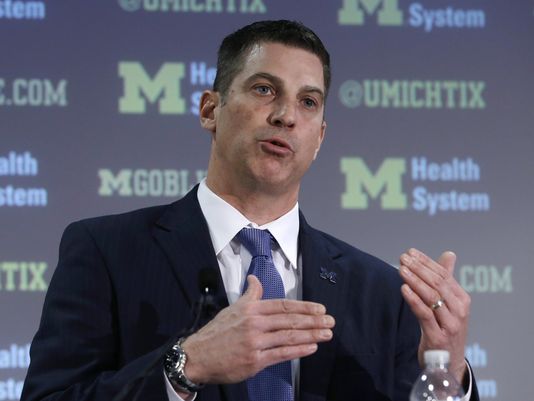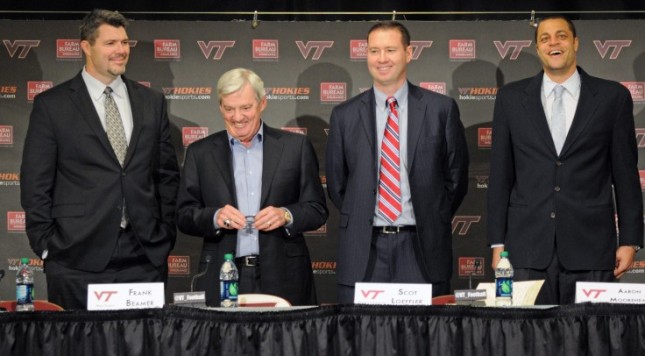The start of the 2014 college football season comes ever closer. You know you want to read about coaching intrigues, so that you can discuss them with your buddies at the water cooler or on the last few non-football weekends of August with your friends. The Student Section’s editorial team is here to help. We’ll have another coaching roundtable on tap tomorrow as well.
*
Question No. 1: Which coordinator’s reputation is most squarely on the line this season?
Bart Doan:
On Twitter @TheCoachBart
I’m probably not answering the question correctly, but I’ll put enough words in this spot for the teacher to assume something intelligent was said somewhere, and thus it’s worth a decent grade without reading … a time-tested way to get through college classes.
The answer I’m going with is Jim Chaney, the offensive coordinator at Arkansas. Look, I’ve met Chaney, and he’s a wonderful guy and pretty funny, and his reputation is set in stone so there’s no reason to really worry about it, but the current situation at Arkansas isn’t butterflies and gum drops.
And as the old routine goes, when the coach starts getting heat, coordinators get fired to save the coach one extra year before the coach gets fired.
Chaney has been successful everywhere he’s been, including probably his best work at Purdue under Joe Tiller when the Boilers went all “basketball on grass” and really changed the way offense was done in the B1G in some ways. It’d be a shame if he was the scapegoat if Arkansas has another poor season, but so goes the routine, one I certainly cannot change.
Terry Johnson:
On Twitter @SectionTPJ
Without question, it’s Virginia Tech’s Scot Loeffler.
Make no mistake about it: Loeffler is an accomplished QB coach. Throughout his tenure, he’s helped develop some of the game’s top signal callers including current NFL players Tom Brady, Chad Henne, and Logan Thomas. He was also instrumental in turning Tim Tebow into more a of a pro-style passer in 2009, earning Tebow a couple of seasons in the NFL.
However, Loeffler’s career as an offensive coordinator is a different story. After an moderately successful season at Temple in 2011 (65 nationally in total offense, but 7th in rushing), things took a turn for the worse. In his lone year at Auburn, the Tigers finished 118th in total offense, averaging just 305 yards per game. His first season at Virginia Tech didn’t go much better as the Hokies ranked 100th nationally in total offense, and failed to eclipse the 350-yard barrier in 7 of its 13 contests.
More importantly, the team averaged only four yards per carry in two games last year.
That’s not going to get the job done at Virginia Tech, which has won more games than any team in the conference since it joined the ACC in 2004. If the Hokies are going to compete – and Loeffler is going to stick around – they must improve in the running game this fall.
Matt Zemek:
On Twitter @SectionMZ
Loeffler’s an excellent answer. Since that one’s taken, there are still several other strong choices for this question. My selection is Robert Anae of BYU.
Yes, when BYU’s offense was great last season, the Cougars roared, hammering inferior opponents swiftly and with great decisiveness. BYU’s steamrolling of Texas early in the season helped get Mack Brown to ESPN’s studios this season. BYU, both in the present and in the past with Anae as offensive coordinator, has put up gaudy numbers…
… against inferior teams.
What did BYU do last season against Notre Dame? Wisconsin? How about Washington? The Cougars’ offense looked terrible and never found solutions to gameday problems. BYU also stumbled in a lightning-delayed season opener at Virginia (hey, that happens), but a loss at home to Utah was one of the uglier games of the 2013 season.
BYU fans know how important it is for the football program to succeed at this specific point in history. BYU doesn’t enjoy the systemic leverage fellow independent Notre Dame receives. The Cougars want to be able to get that benefit plus additional television buzz as a result of an ascendancy in the college football ranks. Anae has quarterback Taysom Hill back in the fold this season. It’s time to rock and roll and get at least 10 wins, if not 11, against a very manageable schedule. If BYU’s offense doesn’t become more consistent, Anae will not be able to deny the ugly truth.
Question No. 2: Which coordinator is in position to become a coaching superstar this season and, in the process, set himself up for a major head-coaching job within a few years?
Bart Doan:
Confession: I typed this after Matt. We don’t do them simultaneously where the order of the question is how it’s organically written. So I feel boxed into a corner here to pick Doug Nussmeier even though I want to say Pat Narduzzi of Michigan State.
Nussmeier would have a leg up in the sense that if he succeeds at Michigan, he will have done so at 2.5 blue blood programs and have a recruiting foothold on the West Coast, the South, and the Midwest. The majority of elite college football recruits reside in the first two areas.
Nussmeier is also walking into a good situation personally. Advice I have always given people in dating is to date girls who have terrible ex-boyfriends. You’ll have very little to live up to and thus will look an awful lot better than you really are. Make sure the bar is set low enough so that basically a 2-inch vertical can get over it to both her and her parents.
Nussmeier steps into one of those situations, so whatever he does will be seen as a lot more incredible than had he been replacing someone beloved who took a head coaching job and is succeeding there.
As for Narduzzi … hard to figure he doesn’t end up succeeding Mark Dantonio in East Lansing. So there you go on that.

If Doug Nussmeier cleans up the mess Al Borges left behind at Michigan, he’ll save Brady Hoke’s job… and earn the attention of other quality programs in search of a new “Numero Uno,” at least if he wants to become one.
Matt Zemek:
Doug Nussmeier fits perfectly here, but Bart covers Michigan football closely, so that’s more up his alley.
My answer here is Chad Morris of Clemson. No Tajh Boyd and no Sammy Watkins will make this season extremely challenging for Morris. However, therein lies his big opportunity. If Morris can make something, anything, out of the 2014 season with his latest offense at Clemson, it will be the most convincing sign yet that this man needs to be given the keys to a fairly desirable college football kingdom.
Terry Johnson:
My answer is Auburn offensive coordinator Rhett Lashlee.
Let’s be honest: Gus Malzahn’s hurry-up attack has changed college football. This up-tempo style of play has changed the game so much that some of the game’s top defensive minds are trying to legislate it out of existence.
Given the effectiveness of Malzahn’s system, its only a matter of time before a big name school comes after Lashlee. A quarterback under Malzahn in high school, Lashlee guided Shiloh Christian to a record of 40-3-2 as a starter. He would later rejoin forces with Malzahn in his coaching career, working as an assistant from 2004-2010, and as offensive coordinator for the past two seasons.
Malzahn’s record as a head coach in those two years: 21-5 with two conference titles and a national championship game appearance.
More impressively, the system was able to work right away. Just one year after ranking 118th nationally in total offense with a paltry 305 yards per game, Auburn finished 11th in 2013, improving to 501 yards per contest.
That type of instant turnaround is exactly what schools are looking for when they hire a new coach. They want success, and they want it now.
Expect to see his named linked to coaching vacancies in the future. After all, there aren’t many coaches out there that were able to both play and coach under Malzahn.
*
Question No. 3: Which non-head coach coordinator (in other words, Steve Spurrier, Paul Johnson, and Rocky Long are not allowable answers) is going to make the biggest difference for his team this season, for better or worse?
Terry Johnson:
At the risk of sounding like a broken record, I’ll say Kurt Roper of Florida, who will win the Broyles Award as the nation’s top assistant coach.
I won’t mince words: the Gator offense has absolutely stunk ever since Muschamp took the reins as head coach. During his tenure, Florida has finished no higher than 104th nationally in total offense. The offense was so horrid last year, that it lost to 26-20 to a Georgia Southern team that didn’t complete a pass.
Roper will change all that. As I mentioned in our Florida – Tennessee roundtable, Roper is an excellent teacher, and will be able to turn Jeff Driskel into one of the best quarterbacks in the SEC. In addition, he’s well versed in adjusting his scheme to the talent he has available (e.g., the playbook for Eli Manning is much different than it is for Thad Lewis), the Gator offense will thrive regardless of who’s under center.
If turning one of the nation’s worst offenses into a high octane juggernaut doesn’t count as the biggest impact in the country, I don’t know what does.
Matt Zemek:
Pat Narduzzi, Michigan State.
Ask yourself: Is there a coordinator in the country who is more valuable to his team than Narduzzi?
You could say Bud Foster at Virginia Tech. You could cite Morris at Clemson. You wouldn’t find many other similarly reasonable alternatives.
Bart Doan:
I look up and I see no discussion about Indiana football on this particular roundtable, which is like going to a bar assuming they have Rolling Rock on draft … but they do not.
Going with Brian Knorr here, the new defensive coordinator at Indiana. As much as Fred Glass has been behind Indiana football in ways never seen prior, eventually, they need to win and go to bowl games. Kevin Wilson was brought in as an offensive visionary and has played the part well.
But the defense has been atrocious, which is why Brian Knorr now lives in Indiana. IU has done the due diligence of letting the program be torn down to be rebuilt back up for the long haul, and Wilson has shown progress each year.
That said, IU needs to reach a bowl game at the very least for this season to be considered a success, and it’s pretty much on the defense to not be such a sieve to do so. Knorr’s success will be Indiana’s success, and maybe the fate of a whole lot more than just himself. No pressure there in your first year. Knorr knows it has to be better, which is why he was hired. It will be. Just go with me on this one.

